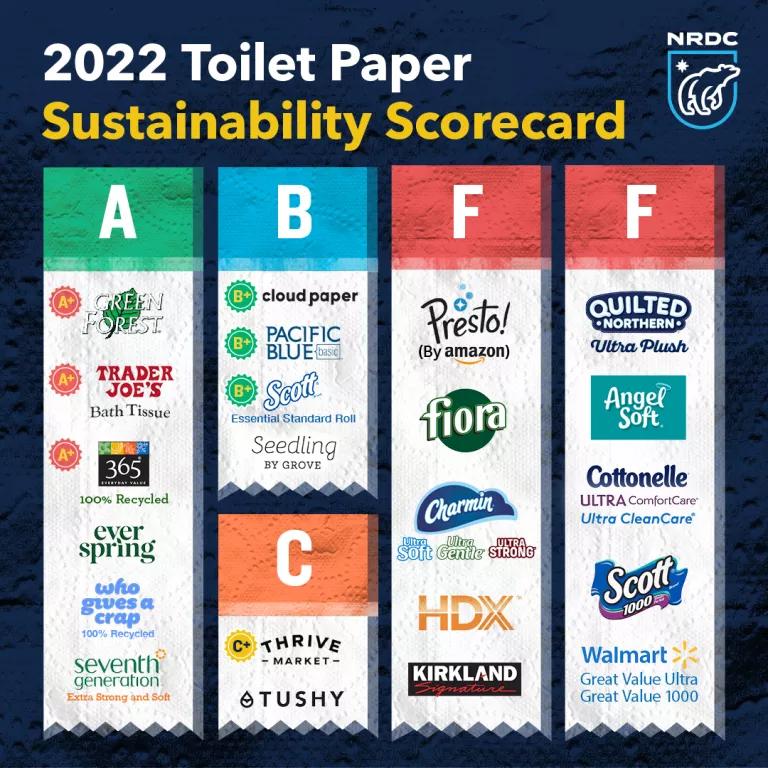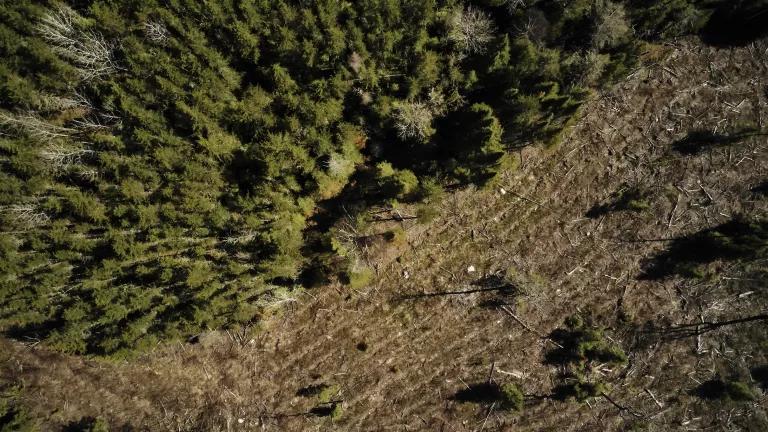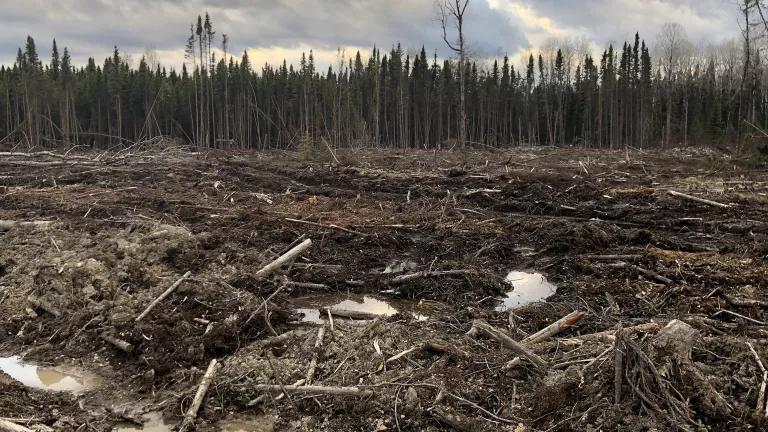2022 Tissue Scorecard: TP’s Future Lies in Sustainability
NRDC’s 2022 Issue with Tissue scorecard unveils more sustainable tissue product options than ever before, while even industry laggards like Procter & Gamble (P&G) show early signs of responding to a climate-conscious marketplace.

The lifespan of the roll of toilet paper in your bathroom may seem fleeting, but its impact on the climate can be long-term. As the world grapples with unprecedented climate chaos, single-use tissue brands like P&G’s Charmin toilet paper continue to funnel the boreal and other climate-critical forests into consumers’ toilets, driving an unsustainable “tree-to-toilet pipeline” that has devastating impacts for Indigenous Peoples, wildlife, and the global climate.
In a new 2022 Issue with Tissue scorecard, NRDC provides a fresh snapshot of the sustainability of the marketplace for toilet paper, paper towels, and facial tissue, revealing which companies are embracing climate-friendly products, and which are fueling climate catastrophe.
Last year’s 2021 scorecard spotlighted the many new products consumers can choose that don’t come at the expense of the world’s forests, particularly primary forests–those forests that have never before been industrially disturbed. Now, this year’s scorecard evaluates more products than any previous version, and includes an updated methodology that reflects the growing urgency with which scientists are calling for the protection of primary forests given their irreplaceable climate value and the critical habitat they provide for species found nowhere else.
As this year’s scorecard shows, the largest tissue brands in America are failing the climate, communities, and biodiversity by continuing to create their products from forests like the Canadian boreal, which stores more carbon than any other terrestrial ecosystem. P&G, Kimberly-Clark, and Georgia-Pacific earned F scores across each of their flagship brands like Charmin, Cottonelle, and Quilted Northern, which they continue to make almost exclusively from virgin forest fiber and fail to avoid sourcing from primary forests.
The new scorecard also includes an even wider array of store brands–many of which are at the bottom of the heap. Home Depot, which faced intense investor scrutiny this year for its forest sourcing practices, along with Lowe’s and ALDI, joined this year’s list of companies failing to make sustainable, climate-friendly tissue brands.
In contrast to the companies “bringing up the rear,” the 2022 scorecard spotlights many new forest-friendly brands available to consumers. Among the 142 products scored, 17 received A grades and 17 received A-pluses, with brands that use post-consumer recycled content receiving the highest grades overall given their lower carbon footprint and reduced forest impact (according to Environmental Paper Network’s Paper Calculator 4.0, recycled content has just one-third the carbon emissions of tissue fiber made from virgin wood). New to this list are grocery store chains like Kroger, H-E-B, and Ahold Delhaize (owner of Stop & Shop and Giant Food), which each sell their own private label lines of 100 percent recycled content tissue products.
There are also more bamboo brands on the scorecard, reflecting the growing market for toilet paper made from alternative fibers. Among the 34 products that received B or B-plus grades were several brands made from 100 percent bamboo fiber, which has a smaller environmental footprint than virgin forest fiber but a larger footprint than recycled fiber and some agricultural residues like wheat straw, another alternative tissue material. However, bamboo’s sustainability varies, with one of the most important factors being whether it was sourced from a bamboo plantation that was established through the clearing and conversion of a primary forest. That’s why more bamboo tissue companies than ever before are seeking certification to carry the Forest Stewardship Council (FSC) logo on their products, which helps indicate to consumers that the fiber was sourced in a way that respects human rights and limits negative forest impacts.
For the first time ever, Georgia-Pacific landed itself among the B-plus scores after making a 100 percent recycled content toilet paper option available online directly to consumers; Kimberly Clark made this same move last year. This development leaves P&G last among the “Big Three” U.S. tissue companies to still receive straight F scores across all of its tissue brands, including Charmin, Puffs, and Bounty.
But, progress for P&G may soon be on the horizon. While still in a testing phase, P&G has begun selling a new Charmin Ultra Eco brand online made from 100 percent bamboo. Although this product is not yet FSC certified or widely and reliably available to consumers, this development marks the first time that the company has looked to provide consumers with a more environmentally friendly alternative to flushing forests.
This new test product signals P&G’s own quiet recognition that business as usual will cause the company to be left in the dust of a marketplace quickly adapting to meet consumer demands for sustainability. Signs of these evolving consumer preferences were recently echoed by the New York Times’ Wirecutter 2022 “Best Toilet Paper” list, which named Seventh Generation’s more sustainable 100% recycled content toilet paper as their “new favorite” relative to Charmin.
Unfortunately, this small step into alternative fibers by P&G doesn’t offset the destruction caused by its virgin forest fiber brands, which continue to be its core product offerings. Moreover, it doesn’t constitute an adequate response to the resolution passed by 67% of the company’s voting shareholders in 2020, which called on the company to determine how it could eliminate deforestation and intact forest degradation from its supply chains. That’s why, as the company’s annual general meeting approaches on October 11th, P&G shareholders must continue to look to hold the company’s leadership accountable for failing to meet the urgency that the current climate crisis demands.
Talk of climate destruction often conjures images of burning dirty energy, but this isn’t the full picture. It also looks like the industrial clearcutting of some of the world’s last remaining primary forests for single-use, throwaway tissue products. We need brands now more than ever before that are willing to be true climate leaders and ditch turning trees into toilet paper. Instead, they can embrace existing solutions by incorporating recycled content and other sustainable alternatives into their products. It isn’t just consumers who can’t wait for companies like P&G to act—it’s our planet.




